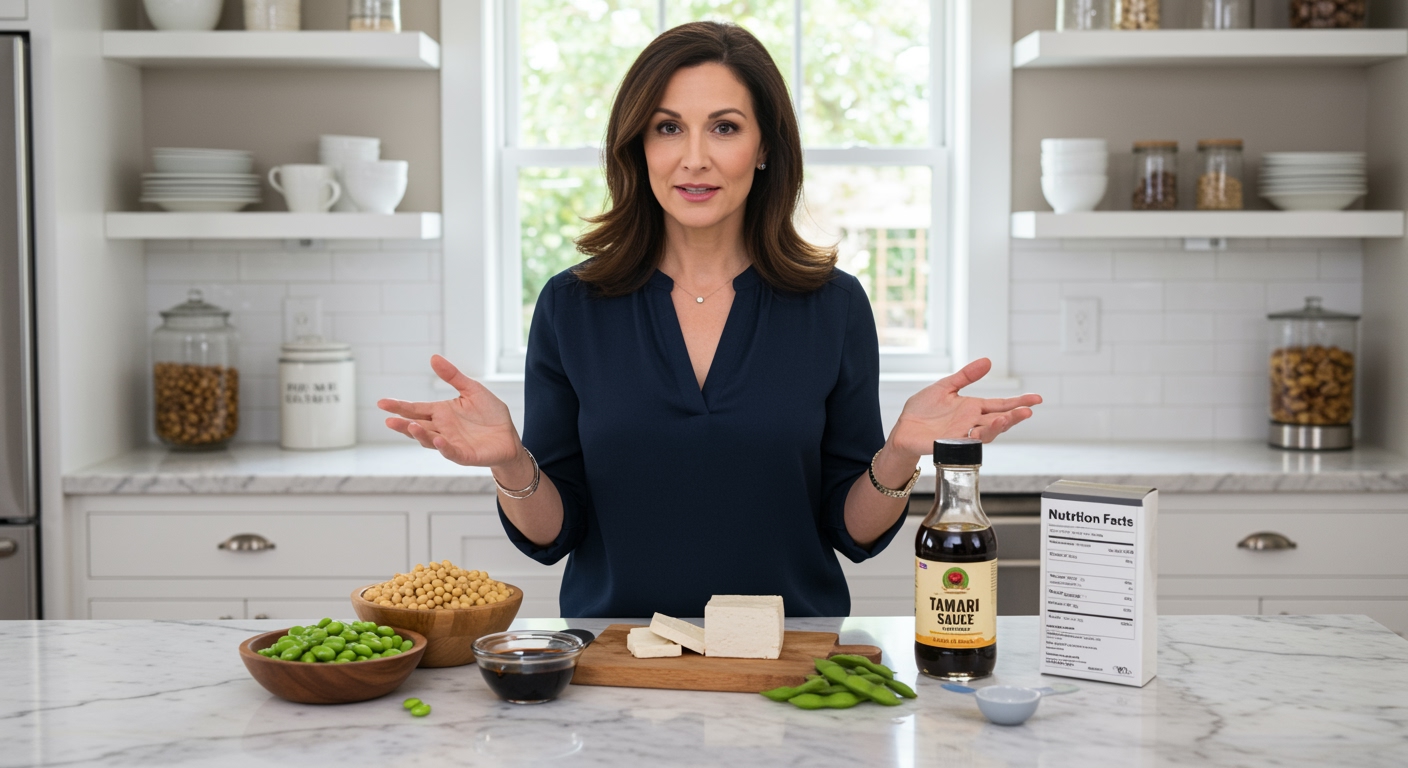✪ Key Takeaway: Soy sauce is not always bad for PCOS when consumed in moderation and chosen wisely for sodium content.
Introduction
You reach for that bottle of soy sauce and suddenly freeze.
Maybe you heard somewhere that soy products mess with your hormones or make PCOS symptoms worse.
Hi, I’m Abdur, your nutrition coach and today I’m going to explain why soy sauce might not be the PCOS villain you think it is.
What Makes Soy Sauce Different From Other Soy Products?
Soy sauce goes through a fermentation process that changes its nutritional profile completely.
During fermentation, beneficial bacteria break down the soy proteins into smaller, more digestible compounds.
This process reduces the concentration of isoflavones, which are the plant compounds that people worry about with PCOS.
Traditional soy sauce contains only about 1-2 mg of isoflavones per tablespoon, compared to 25-50 mg in a cup of soy milk.
The fermentation also creates beneficial compounds like peptides that may actually support metabolic health.
✪ Fact: Fermented soy products contain significantly fewer hormone-affecting compounds than fresh soy products.
Does Soy Sauce Actually Affect PCOS Hormones?
Research shows that moderate soy consumption may actually help women with PCOS rather than harm them.
A 2016 study found that soy intake improved insulin sensitivity and reduced inflammation markers in PCOS patients.
The small amounts of soy sauce you use for cooking contain minimal isoflavones that are unlikely to disrupt your hormone balance.
Your body processes these tiny amounts differently than large doses from soy supplements or multiple servings of soy foods daily.
The fear around soy and hormones often comes from studies using concentrated soy extracts, not normal food amounts.
Most women with PCOS can safely include small amounts of fermented soy products like soy sauce in their diet.
✪ Pro Tip: Focus on portion sizes rather than completely avoiding soy sauce if you enjoy Asian cuisine.
What About The Sodium Content In Soy Sauce?
The real concern with soy sauce for PCOS is not the soy itself but the high sodium content.
One tablespoon of regular soy sauce contains about 1000 mg of sodium, which is nearly half your daily recommended intake.
High sodium intake can worsen insulin resistance and increase water retention, both problematic for PCOS management.
Excess sodium also puts stress on your kidneys and can contribute to high blood pressure, a common PCOS complication.
Low-sodium soy sauce options contain about 40% less sodium while maintaining most of the umami flavor.
Tamari, a wheat-free soy sauce, often has slightly less sodium and may be easier to digest for some women.
✪ Note: Always check nutrition labels as sodium content varies significantly between different soy sauce brands.
How Can You Use Soy Sauce Safely With PCOS?
Start by choosing reduced-sodium versions or diluting regular soy sauce with water or broth.
Use soy sauce as a flavor enhancer rather than the main seasoning in your dishes.
Combine it with other low-sodium seasonings like garlic, ginger, and herbs to create complex flavors without overdoing the salt.
Measure your portions instead of pouring directly from the bottle to control your sodium intake.
Balance soy sauce meals with plenty of potassium-rich vegetables like spinach and broccoli to help your body manage the sodium load.
Consider coconut aminos as an alternative that provides similar umami flavor with much less sodium and no soy.
✪ Pro Tip: Mix soy sauce with rice vinegar and sesame oil to create flavorful dressings that use less soy sauce overall.
The Bottom Line
Soy sauce is not inherently bad for PCOS when used in reasonable amounts and chosen wisely.
The dose makes the poison, and with soy sauce, moderation is your best friend.
What questions do you have about soy sauce and PCOS, or have you noticed any changes in your symptoms when you include or avoid it in your diet?
References
At NutritionCrown, we use quality and credible sources to ensure our content is accurate and trustworthy. Below are the sources referenced in writing this article:
- Endocrine Society: Soy May Help Protect Women with PCOS from Diabetes, Heart Disease
- PubMed: Soy Isoflavone Supplementation in Women with PCOS
- PMC: Effects of Soy Products on PCOS
- Harvard Nutrition Source: Soy





